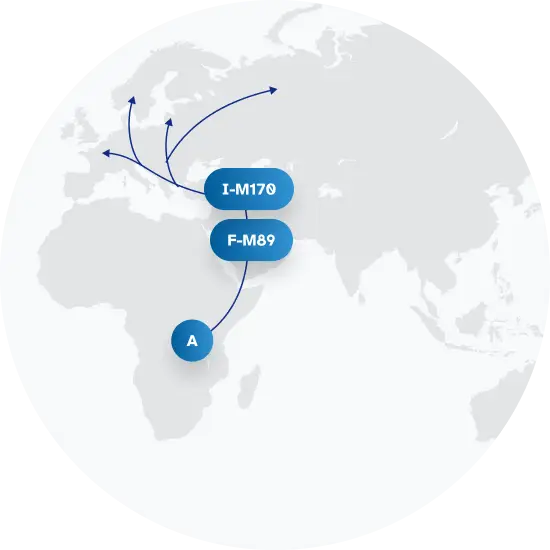Explore the Family Name Hanna
How common is the last name Hanna in the United States?
Based on the Decennial U.S. Census data, the popularity of the surname Hanna has steadily increased between 2000 and 2010. In 2000, Hanna was ranked at 887 among all surnames recorded that year and then improved its standing to 867 by the year 2010, indicating a 2.25% rise in rank. Alongside this, the count of individuals bearing the surname also saw an uptick - from 35,599 in 2000 to 39,890 in 2010, marking a significant 12.05% increase. The proportion of the Hanna surname per 100,000 also rose by 2.42 during the same period.
| 2000 | 2010 | Change | |
|---|---|---|---|
| Rank | #887 | #867 | 2.25% |
| Count | 35,599 | 39,890 | 12.05% |
| Proportion per 100k | 13.2 | 13.52 | 2.42% |
Race and Ethnicity of people with the last name Hanna
Moving over to the ethnicity breakdown, the Decennial U.S. Census data reveals interesting shifts in the ethnic identity associated with the surname Hanna. While the majority of individuals identified as White (87.38% in 2000, slightly decreasing to 87.09% in 2010), there were notable increases in other ethnicities. The Asian/Pacific Islander group experienced a considerable growth of 60.66%, going from 0.61% in 2000 to 0.98% in 2010. Hispanics also increased their representation from 1.77% to 2.71%, marking a 53.11% change. However, the percentage of people identifying with two or more races decreased by 28.66%. Black representation remained relatively stable, while American Indian and Alaskan Native representation saw a small decrease.
| 2000 | 2010 | Change | |
|---|---|---|---|
| White | 87.38% | 87.09% | -0.33% |
| Black | 6.46% | 6.4% | -0.93% |
| Hispanic | 1.77% | 2.71% | 53.11% |
| Two or More Races | 3.14% | 2.24% | -28.66% |
| Asian/Pacific Islander | 0.61% | 0.98% | 60.66% |
| American Indian and Alaskan Native | 0.63% | 0.57% | -9.52% |
Hanna ancestry composition
23andMe computes an ancestry breakdown for each customer. People may have ancestry from just one population or they may have ancestry from several populations. The most commonly-observed ancestry found in people with the surname Hanna is British & Irish, which comprises 43.9% of all ancestry found in people with the surname. The next two most common ancestries are French & German (19.1%) and Coptic Egyptian (8.1%). Additional ancestries include Levantine, Eastern European, Scandinavian, Italian, and Iranian, Caucasian & Mesopotamian.
Ready to learn more about your ancestry? Get the most comprehensive ancestry breakdown on the market by taking our DNA test. Shop 23andMe
| ANCESTRY BREAKDOWN | COMPOSITION |
|---|---|
| British & Irish | 43.9% |
| French & German | 19.1% |
| Coptic Egyptian | 8.1% |
| Other | 28.8% |

Possible origins of the surname Hanna
Your DNA provides clues about where your recent ancestors may have lived. Having many distant relatives in the same location suggests that you may all share common ancestry there. Locations with many distant relatives can also be places where people have migrated recently, such as large cities. If a large number of individuals who share your surname have distant relatives in a specific area, it could indicate a connection between your surname and that location, stemming from either recent ancestral ties or migration.
Based on 23andMe data, people with last name Hanna have recent ancestry locations in the United Kingdom of Great Britain and Northern Ireland and Ireland.
| RECENT ANCESTRY Location | Percentage |
|---|---|
| Greater London, United Kingdom | 72.50% |
| Merseyside, United Kingdom | 72.40% |
| Greater Manchester, United Kingdom | 72.30% |
| West Midlands, United Kingdom | 72.00% |
| Glasgow City, United Kingdom | 72.00% |
What Hanna haplogroups can tell you
Haplogroups are genetic population groups that share a common ancestor on either your paternal or maternal line. These paternal and maternal haplogroups shed light on your genetic ancestry and help tell the story of your family.
The top paternal haplogroup of people with the surname Hanna is I-Y4751, which is predominantly found among people with European ancestry. Haplogroup I-Y4751 is descended from haplogroup I-M170. Other common haplogroups include R-L664 and I-L126, which are predominantly found among people with European and European ancestry. Other surnames with similar common haplogroups are: Hannah, Diamond, Ennis, Carson, Cason, Jamison, Morrow, Atchison, Lowry, Henry.
The most common maternal haplogroups of people with Hanna surname are: H1, T2b, H. These most commonly trace back to individuals of European ancestry.
 Paternal Haplogroup Origins I-M170
Paternal Haplogroup Origins I-M170Your maternal lineage may be linked to Marie Antoinette
Because it is so dominant in the general European population, haplogroup H also appears quite frequently in the continent's royal houses. Marie Antoinette, an Austrian Hapsburg who married into the French royal family, inherited the haplogroup from her maternal ancestors. So did Prince Philip, Duke of Edinburgh, whose recorded genealogy traces his female line to Bavaria. Scientists also discovered that famed 16th century astronomer Nicolaus Copernicus traced his maternal lineages to haplogroup H.

What do people with the surname Hanna have in common?
Spoiler alert: it's complicated. People with the same last name are usually no more genetically similar than a randomly sampled group of people from the same population. That said, people with the same surname are more likely to have similar ancestries than randomly sampled individuals. The reason is the tendency of people with similar cultural or geographical backgrounds to preferentially mate with one another. That's why people who share a surname may be more likely to share traits and tendencies in common than people within the general population. Check out the percentages below to see the prevalences of tastes, habits, and traits of people with your surname compared with prevalences among 23andMe users.
Preferences
Traits
Habits
Wellness
Are health conditions linked to the last name Hanna?
The short answer is that, if there is an association between surname and health, it's usually more about your ancestry than your name. Individuals with a given surname are no more genetically similar than the general population but often have similar ancestries. The populations of people associated with those shared ancestries often have sets of genetic variations, also known as alleles, in common. Some of those alleles are associated with a greater likelihood of developing certain diseases.
Disease variant frequency by ancestry
Disease allele frequencies in populations associated with the surname Hanna are shown below. Important Note: not everyone with a disease allele will develop these health condition


























